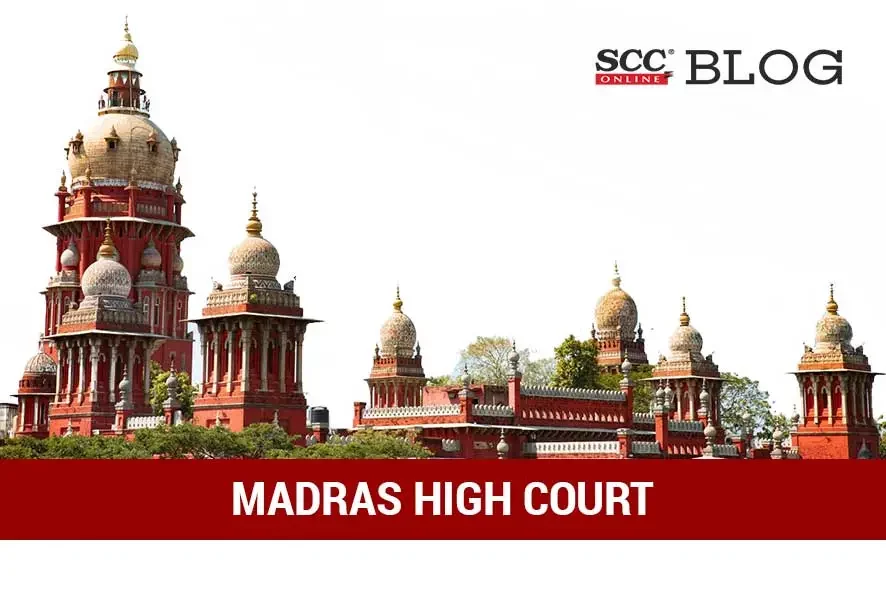Madras High Court: In a writ petition filed concerning the issue of continuation of V. Senthil Balaji as a Cabinet Minister of the State of Tamil Nadu consequent to his arrest and as to whether a Minister could continue in office without being assigned any responsibilities and duties, that is without any portfolios, while in judicial custody, the division bench of Sanjay V. Gangapurwala*, CJ. and P.D. Audikesavalu, J. said that in the absence of any statutory disqualification incurred by Senthil Balaji, it would not be permissible for the Court to issue certain directions to the Governor to take a decision in a particular manner. Thus, it left it to Chief Minister MK Stalin to decide about the continuance of Senthil Balaji (who is in judicial custody) as a Minister without Portfolio.
Background:
The Supreme Court in Y. Balaji v. Karthik Desari, 2023 SCC OnLine SC 645 directed the Enforcement Directorate (‘ED’) to proceed with the case registered against V.Senthil Balaji and conclude the investigation within two months. Pursuant to this, the ED registered a case on 14-6-2023 under Section 4 of the Prevention of Money Laundering Act, 2002 (‘PMLA’) and Senthil Balaji was arrested by the ED on 14-6-2023.
Also read:
Consequently, the Governor of Tamil Nadu issued an order dated 17-6-2023 notifying the re-allocation of portfolio of Senthil Balaji upon the recommendation and advice of the Chief Minister and took serious objections to his continuance as a Minister without portfolio. On 29-6-2023, the Governor addressed a letter dismissing Senthil Balaji from the Council of Ministers and observed that his continuation will not only lead to obstruction of due process of law and disrupt the course of justice, but also would lead to breakdown of the Constitutional machinery in the State. The said letter was kept in abeyance on the same day by the Governor, awaiting the opinion of the Attorney General for India.
Analysis:
The Court took note of Section 5 read with Section 6 of the Representation of the People Act, 1951 (‘Act of 1951’), and said that, neither the Constitution of India nor the Act of 1951 provides for disqualification of a Minister from the State Legislative Assembly and/or Council, then the one providing for being a Member of the Legislative Assembly and/or the Council.
As per the Court, the petitioners could not point out any provisions either in the Constitution of India nor in the Act of 1951, which dis-entitles the person in custody or against whom chargesheet has been filed, from being a Member of the Legislative Assembly/Council and/or a Minister of the State Legislature. The Court said that the petitioners’ contention is more on the morality of a person, who is under custody and against whom chargesheet has been filed, to continue as a Minister and that too, as a Minister without portfolio.
The Court said that the Governor of the State of Tamil Nadu has passed an order communicating that Senthil Balaji is removed as a Minister, but subsequently, on the very same day, kept the same in abeyance.
The Court further said that in the absence of any statutory disqualification incurred by Senthil Balaji, it would not be permissible for the Court to issue certain directions to the Governor to take a decision in a particular manner. Moreover, it is a matter of debate as to whether the Governor can unilaterally disqualify a person officiating as a Minister, though he has not incurred any disqualification under the Constitution of India or under any statute.
The Court took note of Nabam Rebia and Bamang Felix v. The Deputy Speaker, Arunachal Pradesh Legislative Assembly, (2016) 8 SCC 1 and said that it is explicit that if the Governor chooses to ‘withdraw his pleasure’ in respect of a Minister, he must exercise his discretion with the knowledge of the Chief Minister and not by keeping him in the dark, thus there should be consensus with the Chief Minister.
The Court quoted Dr. BR Ambedkar saying that “Article 163 will have to be read in conjunction with other Articles which specifically reserve the powers to the Governor. It is not a general clause giving the Governor power to disregard the advice of his Ministers, in any matter in which he finds he ought to disregard”. Further, it said that in the present case, the Chief Minister had never consented to the exercise of discretion by the Governor.
The Court also took note of Manoj Narula v. Union of India, (2014) 9 SCC 1, wherein it was said that the Prime Minister or the Chief Ministers may be well advised to consider avoiding any person in the Council of Ministers, against whom charges have been framed by a Criminal Court in respect of offences involving moral turpitude and also offences specifically referred to in Chapter III of the Act of 1951.
The Court further said that if the Chief Minister feels that a particular elected representative cannot be assigned the responsibility of a Minister, there cannot be moral or Constitutional basis to retain such a Member of the Legislative Assembly as a Minister without portfolio, which would be opposed to the ethos, good Governance and Constitutional morality or integrity. The founding fathers of our Constitution may not have comprehended corrosion of good and clean Governance to an extent that a person would be retained as a Minister without portfolio, that too while in custody nor did they envisaged that the Executive Head would reward an elected Member the status of a Minister, though finding him not fit to discharge the responsibilities of a Minster. A Minister without portfolio is a constitutional travesty.
[S. Ramachandran v State of Tamil Nadu, Writ Petition Nos.18823 of 2023, Order dated 05-09-2023]
*Order by: Chief Justice Sanjay V. Gangapurwala
Advocates who appeared in this case :
For the Petitioner: Advocate S.Sheik Ismail, Advocate Shakthivel, Senior Counsel.V.Raghavachari
For the Respondents: Advocate General R.Shunmugasundaram, State Government Pleader.P.Muthukumar, Advocate A.G.Shakeenaa







